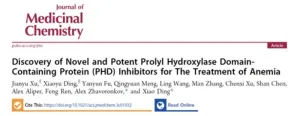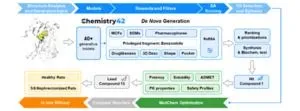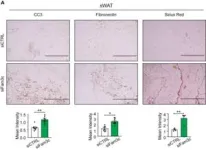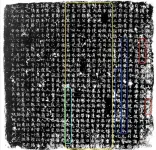(Press-News.org) Insilico Medicine(“Insilico”), a clinical stage generative artificial intelligence (AI)-driven drug discovery company, recently published an early research that it has identified MYT1 as a promising new therapeutic target for breast and gynecological cancer, and discovered a series of novel, potent, and highly selective inhibitors specifically targeting MYT1. These findings were supported by Insilico’s AI-driven generative biology and chemistry engine and published in the Journal of Medicinal Chemistry in Dec 2023.
Across the world, breast and gynecological cancers pose serious threats to women’s health, fertility, and overall quality of life. In order to identify potential targets for new therapeutics, the research team leverage Insilico's proprietary AI-driven target identification platform, PandaOmics, to analyze data of five forms of gynecological cancers, including ovarian, endometrial, cervical, and breast cancer particularly triple-negative breast cancer. Remarkably, MYT1 consistently ranked at the forefront across all diseases in terms of relevance.
MYT1 is a member of the Wee1-kinase family, rarely expressed in most normal tissues but highly expressed in most cancer types. It has been reported that MYT1 inhibition and CCNE1 amplification, a condition known as synthetic lethality, play crucial functions in cell cycle regulation, which indicates MYT1 inhibition is a promising synthetic lethal therapeutic strategy for the treatment of cancers with genome instability (e.g. CCNE1 amplification).
However, MYT1 is highly homologous to Wee1, which makes it challenging to design selective MYT1 inhibitors. In this study, Insilico addressed the gap in selective MYT1 inhibitors with the support of Chemsitry42, Insilico’s AI-driven small molecule generation platform. Using structure-based drug design (SBDD) strategies and applying rigorous filters for similarity and selectivity, Insilico designed an array of compounds targeting MYT1 from scratch. Amongst these novel compounds, one series emerged as hit compounds.
Insilico then conducted x-ray crystal structure analysis of the complex and found significant impact on the activity of subtle chemical structure modifications. This knowledge provided guidance for further molecular optimization, leading Insilico to the discovery of the lead compound, Compound 21. Compound 21 presents good MYT1 activity and excellent selectivity over Wee1 and the other kinase panel that reduces the potential risk for off-target effects and might translate to a safer profile. In preclinical studies, it also shows potent in vivo antitumor efficacy, and a promising profile in ADME and PK/PD.
“The innovative approach of this program has not only present a method for effective target identification but has also led to the development of a promising selective MYT1 inhibitor. ”said Yazhou Wang, Ph.D., medicinal chemistry leader of the MYT1 program from Insilico Medicine, and the first author of this paper. “Compound 21 expands Insilico's synthetic lethal pipeline and paves the way toward a safer, more effective therapeutic future for patients battling” gynecological and breast cancers.”
About Insilico Medicine
Insilico Medicine, a global clinical stage biotechnology company powered by generative AI, is connecting biology, chemistry, and clinical trials analysis using next-generation AI systems. The company has developed AI platforms that utilize deep generative models, reinforcement learning, transformers, and other modern machine learning techniques for novel target discovery and the generation of novel molecular structures with desired properties. Insilico Medicine is developing breakthrough solutions to discover and develop innovative drugs for cancer, fibrosis, immunity, central nervous system diseases, infectious diseases, autoimmune diseases, and aging-related diseases. www.insilico.com
END
JMC | Insilico Medicine presents the discovery of the potent and selective MYT1 inhibitors for the treatment of cancer through generative AI
2024-01-19
ELSE PRESS RELEASES FROM THIS DATE:
Professors Yoon-Kyoung Cho elected as Member of National Academy of Engineering of Korea!
2024-01-19
Professor Yoon-Kyoung Cho from the Department of Biomedical Engineering at UNIST has been elected as a member of the National Academy of Engineering of Korea (NAEK), the most prestigious organization in the field of engineering in Korea.
On January 4, the National Academy of Engineering of Korea (NAEK) announced the election of 50 new members, comprising 25 academic and 25 industrial figures, in recognition of their distinguished and ongoing achievements in original research. Membership in NAEK is considered one of the highest professional distinctions for engineers. Professor Cho’s name appeared ...
New study reveals critical role of FAM3c in breast cancer progression
2024-01-19
A groundbreaking study conducted by Professor Jiyoung Park and her research team in the Department of Biological Sciences at UNIST has identified FAM3C, a metabolism-regulating signaling molecule produced by cancer-associated adipocytes (CAAs), as a key regulator of breast cancer progression within the tumor microenvironment (TME). The findings, published in the prestigious academic journal Cancer Research, shed light on the potential for targeted therapies in the treatment of breast cancer.
The study demonstrates that overexpression of FAM3C in cultured adipocytes significantly reduces cell death in both adipocytes and co-cultured breast cancer ...
New medicine can create a new life for diabetes patients – without needles!
2024-01-19
There are approximately 425 million people worldwide with diabetes. Approximately 75 million of these inject themselves with insulin daily. Now they may soon have a new alternative to syringes or insulin pumps. Scientists have found a new way to supply the body with smart insulin.
The new insulin can be eaten by taking a capsule or even better, within a piece chocolate.
Inside these we find tiny nano-carriers to which the insulin is encapsulated. The particles are 1/10,000th the width of a human hair and so small that you cannot even see them under a normal microscope.
“This ...
Miami Cancer Institute publication analyzes role of tissue-agnostic therapies for the treatment of primary brain tumors
2024-01-19
MIAMI, FL – January 19, 2024 – Researchers from Miami Cancer Institute, part of Baptist Health South Florida, today published a study in Trends in Cancer that analyzes the use of tissue-agnostic therapeutics in patients with primary brain tumors (PBTs). The publication describes the current and potential impact of tissue-agnostic therapies on the management of PBTs. As part of the publication, the researchers discuss data from clinical trials of tissue-agnostic targets for PBTs in the context of challenges in managing these tumors. They also describe additional tissue-agnostic ...
Discovery unravels the mystery of a rare bone disease
2024-01-19
A McGill-led team of researchers have made an important discovery shedding light on the genetic basis of a rare skeletal disorder. The study, published in Nature Communications, reveals that a defect in a specific gene (heterozygous variants in the matrix Gla protein, or MGP) may cause a disorder that affects the structure of connective tissues that supports the body.
MGP is a special protein found in blood vessels and cartilage that helps prevent the hardening of these tissues in the body. If MGP is completely missing, it can lead to Keutel syndrome, a rare condition where tissues become calcified, causing issues in the skeleton and blood vessels.
However, in this case, ...
Infantile spasms: Speeding referrals for all infants
2024-01-19
Infantile epileptic spasms syndrome (IESS), often called infantile spasms, is the most common form of epilepsy seen during infancy. Prompt diagnosis and referral to a neurologist are essential. But research suggests infants are likely to experience delays in referral to a neurologist if their families are from historically marginalized racial/ethnic backgrounds. A new open-access training module for front-line providers from OPENPediatrics, an online learning community launched by Boston Children’s Hospital, aims to change that.
The free, publicly accessible Infantile Spasms curriculum includes short lectures and videos illustrating ...
China’s medieval Tang dynasty had a surprising level of social mobility, new study uncovers
2024-01-19
In studying social mobility in today’s industrialized nations, researchers typically rely on data from the World Economic Forum or, in the United States, the General Social Survey. But examining the same phenomena from past centuries is a more daunting task because relevant statistics are harder to come by.
However, a social science research team has now discovered a way to examine professional advancement in medieval China (618-907 CE) by drawing from the tomb epitaphs during the Tang Dynasty. These epitaphs contain the ancestral lineages, names, and office titles (e.g., Minister of Personnel, Minister of the Court of Judicial Review, and ...
Research into the nature of memory reveals how cells that store information are stabilized over time
2024-01-19
BUFFALO, N.Y. – Think of a time when you had two different but similar experiences in a short period. Maybe you attended two holiday parties in the same week or gave two presentations at work. Shortly afterward, you may find yourself confusing the two, but as time goes on that confusion recedes and you are better able to differentiate between these different experiences.
New research published in Nature Neuroscience published on January 19, reveals that this process occurs on a cellular level, findings that are critical to ...
Generative AI helps to explain human memory and imagination
2024-01-19
Recent advances in generative AI help to explain how memories enable us to learn about the world, re-live old experiences and construct totally new experiences for imagination and planning, according to a new study by UCL researchers.
The study, published in Nature Human Behaviour and funded by Wellcome, uses an AI computational model – known as a generative neural network - to simulate how neural networks in the brain learn from and remember a series of events (each one represented by a simple scene).
The ...
KIST's 'Moonwalk', a robot that makes climbing Bukhansan Mountain easier
2024-01-19
As people age, they gradually lose muscle strength in their arms and legs, making it difficult for them to participate in leisure activities such as hiking and traveling, and they often need to rely on assistive devices such as canes and wheelchairs for mobility. However, these assistive devices do not improve muscle strength, so wearable robots that can compensate for the lack of muscle strength with the help of robots are attracting attention as an innovative technology to improve the health and quality of life of the elderly.
Dr. Lee Jongwon of the Intelligent Robotics Research Center at the Korea Institute of Science and Technology(KIST) ...








